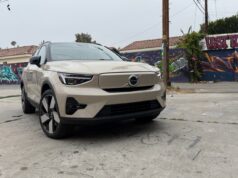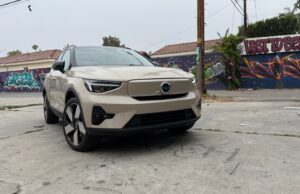
Ford has announced the introduction of the new EcoBoost 4-cylinder engines, which will join the existing 3.5L V6 EcoBoost engine. The new turbocharged 4-cyl engines will be available as a 1.6L and 2.0L.
Ford has yet to announce official performance numbers, but the 1.6L is expected to put out around 180 horsepower and 175-180 lb-ft. of torque. The first application of the 1.6L will be in the Ford C-Max in late 2010. The 2.0L will be launched in larger European models and in North America in 2010.
FORD EXPANDS GLOBAL ECOBOOST LINE; HIGH-VOLUME FOUR-CYLINDER ENGINES TO BE OFFERED IN ALL REGIONS
* Ford’s current 3.5-liter EcoBoost V-6 engine will be complemented with new 1.6-, 2.0-liter turbocharged, direct-injected I-4 engines for Europe, North America and Australia
* The new high-volume four-cylinder EcoBoost engines will be offered across most of Ford’s global product lineup, including midsize and large vehicles
* The new engines will deliver up to a 20 percent improvement in fuel economy on up to 1.3 million vehicles globally by 2013, retaining fun-to-drive characteristics of Ford products
DEARBORN, Mich., Sept. 15, 2009 – Ford’s high-performance, fuel-saving four-cylinder EcoBoost engine family is making its global debut early in 2010, marking a major milestone in the company’s strategy to deliver greater fuel economy for millions.
The all-new EcoBoost 1.6-liter and 2.0-liter I-4 engines combine turbocharging and direct-injection technology to deliver fuel consumption and CO2 emissions reduced by up to
20 percent versus conventional, larger-displacement gasoline engines with similar power output. At the same time, EcoBoost engines will deliver the off-the-line power and performance characteristics familiar to diesel enthusiasts.
The fun-to-drive nature of EcoBoost engines is leading Ford to introduce these fuel-saving powertrains in large volumes virtually across its lineup. For example, by 2013 more than 90 percent of Ford’s North American lineup will be available with EcoBoost technology, and nearly 80 percent of Ford’s global nameplates will have an available EcoBoost option.
“Ford engineers looked at every available engine configuration, comparing power, price, economy and emissions, determining the best way to power Ford vehicles in the future,” said Derrick Kuzak, group vice president, Ford Global Product Development.
“EcoBoost technology gives us everything: a combination of the performance buyers expect and fuel economy improvements they demand that, until now, only has been achievable with the latest-generation turbo-diesel powertrains,” he added.
Going forward, Ford will shift its powertrain allocations. Under the new system:
* A 3.5-liter EcoBoost V-6 would replace naturally aspirated V-8 engines
* A 2.0-liter EcoBoost I-4 would replace naturally aspirated V-6 engines
* A 1.6-liter EcoBoost I-4 would replace naturally aspirated large I-4 engines
“With this next phase of our plan, we will expand our EcoBoost engine offerings, adding higher-volume, fuel-efficient four-cylinder engines to the premium V-6 engine we currently offer in North America,” said Kuzak.
For European markets, the first available I-4 EcoBoost engines will be 1.6-liter units that launch on the all-new Ford C-MAX in late 2010. The 2.0-liter EcoBoost engine will arrive on larger European Ford products and will be launched in North America in 2010. Australia will see the Ford Falcon arrive with an available 2.0-liter EcoBoost I-4 in 2011.
By 2013, global EcoBoost volume throughout the Ford, Lincoln and Mercury vehicle family is expected to be 1.3 million units, with up to 750,000 sales coming from North America alone.
Why EcoBoost?
EcoBoost engines combine direct gasoline injection with turbocharging to lower emissions, improve performance and reduce fuel use. Technological advancements provide driving fun with high power ratings from lower-capacity engines and torque performance similar to that found on turbocharged diesels.
“EcoBoost is an integrated part of Ford’s global mid- and long-term sustainability strategy,” said Kuzak. “Combined with advanced multi-speed transmissions, electric power steering, weight reductions and aerodynamic improvements, EcoBoost will help Ford address the world’s global warming and energy challenges without sacrificing the joy of driving.”










